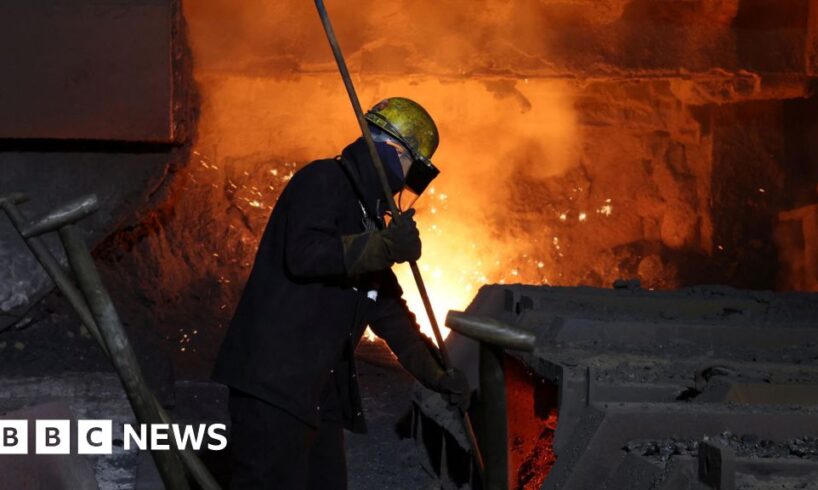
Government plans to give businesses a cash grant for innovative new steel projects have been abandoned.
Ministers insist they will stick to a manifesto pledge to spend £2.5bn on the steel industry – and there will be alternative ways for businesses to access funding.
But a competition that would have awarded grants for new ideas will not go ahead after a decision was made to prioritise supporting loss-making steelworks instead.
The government says it wants to “create a competitive business environment” for the steel industry by helping the nation’s remaining steelworks become profitable businesses.
The UK’s steel industry has faced major financial difficulties in recent years due to high energy prices, increased tariffs and a glut of steel in the global market.
Maintaining the ability to produce primary steel is seen by Downing Street as an important issue of national security.
Four of the UK’s six main steel companies currently receive some form of financial support from the state.
Labour pledged to spend £2.5bn on the steel industry in its election manifesto last summer.
That was expected to include a competitive process in which companies could bid for government grants for steel projects.
The Department for Business and Trade (DBT) had hoped to officially announce that plan when it publishes the government’s steel strategy next month.
When the government launched its consultation on the upcoming strategy earlier this year, it said it would be “identifying support for investment opportunities”.
But ministers have since been forced to spend huge sums to take over the day-to-day running of the British Steel plant in Scunthorpe and pay the wages of workers at Speciality Steels UK (SSUK) in South Yorkshire.
DBT had been looking at whether it could still afford the grants, but a decision was made several weeks ago not to go ahead with the plan.
Representatives from the steel industry met the steel minister Chris McDonald on Tuesday, but were given no clear indication about the change of plan.
Government sources say it was not mentioned at the meeting because the competition had not yet been officially announced.
Businesses will still be able to access money for steel projects through the government’s National Wealth Fund, but any bids will have to involve some private financing and will effectively be competing with other sectors too.
The National Wealth Fund is an investment project launched by the Treasury last year and has up to £27.8bn, which can be used to help fund industrial and clean energy projects.
It’s understood that some of that money has been earmarked specifically for steel and that the first of those successful projects could be announced as soon as next month.
Chris McDonald told BBC News the government would still be giving “a huge amount of support” to the steel industry, including helping with energy prices and procurement.
He said that government money was still available for investment in steel projects, but that the private sector would need to “determine which of those opportunities they want to go in for”.
Ministers see the government’s support for the steel sector as one of Labour’s biggest political wins since last year’s general election and believe the industry can become more profitable.
But many in Whitehall are still worried about the future financial viability of the sector.
Last month the European Union shocked Downing Street when it announced surprise new plans for a 50% import tariff on steel.
UK Steel, the industry’s main lobbying organisation, has said the move would pose an “existential threat” for British steelmakers.
The fragmented nature of the UK’s steel sector has also become a cause for concern in Westminster in recent months.
Senior figures in DBT have backed the idea of a private sector merger of the UK’s steel companies, but there’s an acceptance that any such move would only be possible with the backing of the current owners.
Ministers took control of British Steel in Scunthorpe in April after accusing the Chinese owners Jingye of trying to close down the site’s blast furnaces, a move that has so far cost nearly £250m.
The search for a new buyer for British Steel has stalled in recent months after Jingye unexpectedly asked for a sum in the hundreds of millions to hand over ownership.
There is some concern within government that finding a buyer for British Steel is proving more difficult because the site uses old-fashioned blast furnaces.
SSUK, part of the Liberty Steel metals empire of controversial tycoon Sanjeev Gupta, was placed in the hands of a government appointed liquidator in August and ministers have agreed to cover the ongoing wages and costs of the plant while a buyer is sought.
It’s understood that a number of commercial buyers have already approached the government about taking over SSUK, which has already transitioned to greener electric arc furnaces.
Tata Steel, in Port Talbot, was given a £500m government rescue package last year to help the company move to greener forms of steelmaking.
Sheffield Forgemasters was nationalised by the Ministry of Defence in 2021 after the company faced financial difficulties throughout the 2010s.





